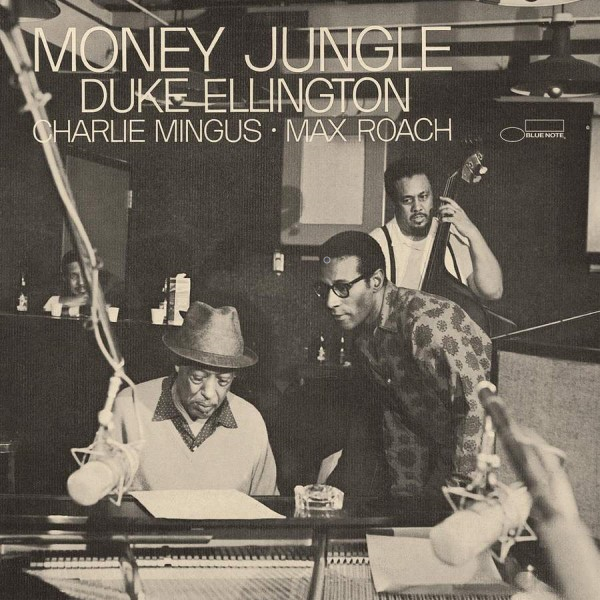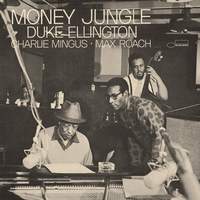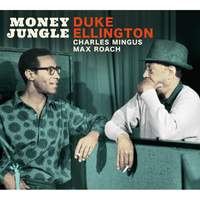Classic Recordings,
Ellington, Mingus & Roach - Money Jungle
 On the face of it the ‘all-star’ jazz sessions tend to seem like cordial endeavours, whereby a producer would bring together a select group of established solo artists who were simpatico with each other, and capitalise on their collective clout, either on stage or in the studio. Although it was common in the big band and swing era for guest artists to appear with the popular ensembles of the day, it was really the advent of bebop in the early forties that saw the rise of the all-star session, featuring independent players untethered to these larger bands. In particular Norman Granz’s highly successful ‘Jazz at the Philharmonic’ concerts, which toured first the states and then the globe, really established the tradition. Big names inevitably came with big egos, but any clashes were usually set aside by the time the tapes were rolling. This was not the case when Duke Ellington, Charles Mingus, and Max Roach met on September 17, 1962, at Sound Makers Studio on Fifty-Seventh Street, Midtown Manhattan, to record the single session for Money Jungle.
On the face of it the ‘all-star’ jazz sessions tend to seem like cordial endeavours, whereby a producer would bring together a select group of established solo artists who were simpatico with each other, and capitalise on their collective clout, either on stage or in the studio. Although it was common in the big band and swing era for guest artists to appear with the popular ensembles of the day, it was really the advent of bebop in the early forties that saw the rise of the all-star session, featuring independent players untethered to these larger bands. In particular Norman Granz’s highly successful ‘Jazz at the Philharmonic’ concerts, which toured first the states and then the globe, really established the tradition. Big names inevitably came with big egos, but any clashes were usually set aside by the time the tapes were rolling. This was not the case when Duke Ellington, Charles Mingus, and Max Roach met on September 17, 1962, at Sound Makers Studio on Fifty-Seventh Street, Midtown Manhattan, to record the single session for Money Jungle.
It must have seemed like a dream date to producer Alan Douglas: two of the modernist leading lights of bebop, Mingus and Roach, playing with their hero Ellington, that most revered composer and bandleader from the older generation, who had been a profound influence on both men. This was especially true for Mingus, who is on record as having said ‘Duke and church’ were his primary musical influences, and Mingus was viewed by many (not least himself) as the true heir to Ellington’s throne, with his adventurous large ensemble compositions on albums such as Mingus Ah Um and Mingus Dynasty. And unusually for a 63 year-old bandleader, Ellington was receptive to the innovations of the younger generation; only a week later he would record an album with John Coltrane, a musician even more progressive than either Mingus and Roach. After achieving unimaginable success for a jazz artist, Black or white, from the twenties through to the forties, the decline of the big bands in the fifties saw many of the big groups dissolve, with Ellington coming close at several points. It was by embracing, in spirit if not in style, a slightly more modernistic sensibility that helped Ellington save his band, with the turning point being Paul Gonsalves’s astonishing 12-minute solo at the Newport Jazz Festival in 1956, which proved so incendiary it caused a mini-riot.

Legend has it that immediately after the track finished Mingus packed up his bass and stormed out of the studio. Some accounts have it that Mingus was unhappy with Roach's playing, others that Mingus was simply in a foul mood, but it’s generally agreed that Ellington followed Mingus out of the studio and managed to talk him into returning to the session. Whilst the rest of the tracks aren’t quite as fractious, an air of tension pervades, with Ellington in particular, attacking his back catalogue with an almost Monk-ish angularity. Although there are some slower moments, with the impressionistic ‘Fleurette Africane’ that immediately follows, sounding like something of a truce, but they still don't sound truly relaxed. On his ballad ‘Solitude’, after a sedate start Ellington is soon peppering the theme with spiky dissonance, and even when Roach is playing a slow shuffle, it’s shot through with a martial rigidity. With Mingus looking for any excuse to interject, it comes across like a couple trying to make a brave face of things in public after a row.
Don’t let this put you off, though. The real joy of Money Jungle is hearing this hugely talented trio tear through numbers like ‘Very Special’, ‘Wig Wise’, or ‘Switch Blade’ with such energy and abandon. Ellington’s piano must surely have been in the red for much of the session, as can be heard in the distortion on those clangorous chords on ‘Caravan’. Throughout Mingus’s bass refuses to fall into line, prodding at Ellington, trying to trip him up, which makes his interactions with Roach’s rhythms all the more dynamic and exciting. Whilst I certainly wouldn’t recommend Money Jungle as an introduction to Ellington’s music - you need to appreciate how refined these tunes can be before witnessing them being roughed up - nevertheless, it remains one the most exciting, and unique, recordings in the history of jazz, warts and all.




